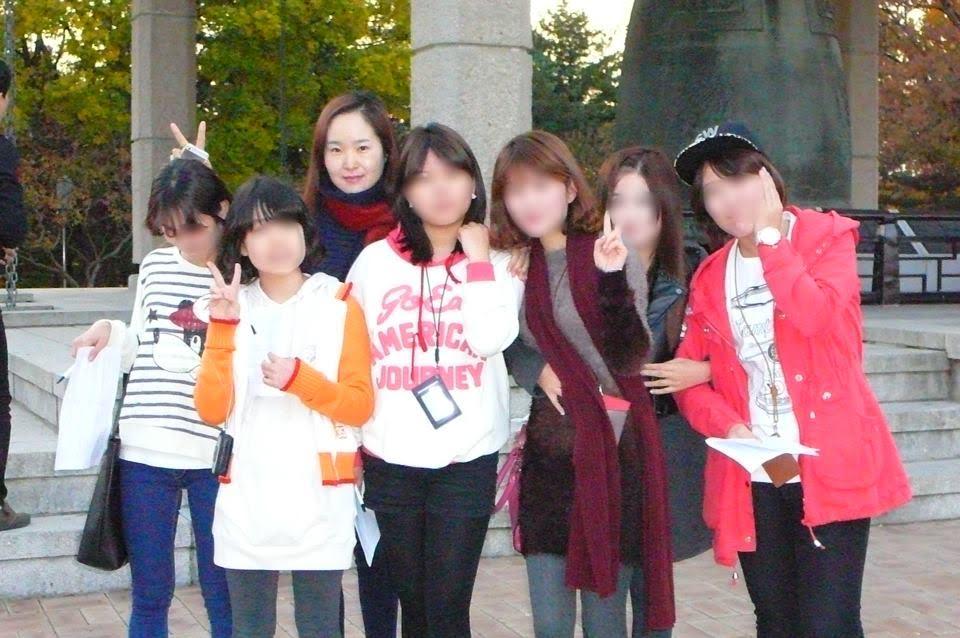Students from the Daum School are shown on a field trip with their teacher. Their faces are blurred to protect their privacy. Many North Korean refugees have trouble adjusting to life in fast-paced South Korea, especially at school.
History class at the Daum School in Seoul looks pretty typical: Some students take notes intently, others take a nap. You can't tell that most of these students have risked their lives to be here.
This is a high school for North Korean refugees in Seoul.
The students here sport the latest haircuts and blast K-pop from their earbuds as they gather at their lockers. But it's their accents that betray them. They’re also smaller than their South Korean counterparts, likely due to malnutrition, and they’re years behind in school. Frankly, it’s hard for their South Korean peers to relate to them.
“At first I wondered if I should tell people I’m from the North,” says Hyun, a student at the school. She was just 10 years old when she left North Korea for China, in search of her mother who had escaped several months earlier. Like many women who fled North Korea, her mother was forced to marry a man in rural China, even though she still had a husband back home.
“She didn’t marry him because she wanted to. There was someone who arranged it,” Hyun says. “You couldn’t survive as a woman on your own there."
North Koreans who escape typically cross the river to China with the help of smugglers. It’s common for these brokers to sell the North Korean women to men in rural China. (Due to China’s one-child policy, which was relaxed in 2015, a generation of rural Chinese men can't find women to marry, and North Korean women are helping to fill the gap.)
Hyun says as a child, she adjusted to life in China and showed promise in school, but eventually her undocumented status became an issue. The Chinese government routinely conducts raids, searching private homes, and forcing North Koreans to return to their country. Hyun didn’t have a citizenship number — the Chinese equivalent of a Social Security number — which meant she wouldn’t be able to go to college in China.
So Hyun fled again, this time to South Korea. At the Daum School, she met other students with North Korean mothers; many of them had Chinese fathers.
A teacher, who asks not to be identified to protect her identity and the identity of her students, tells me about two sisters and the smuggler who was paid to help them escape. She says the smuggler forced the older sister to have sex with him.
According to the teacher, the smuggler said, "If you don’t say yes, I will rape your baby sister. So the elder sister decided to become the victim." And she became pregnant.
There’s no way to verify the story of the two sisters, but in the past, the majority of North Korean refugees were women. They weren’t required to do military service so it was easier for them to escape undetected. And their bodies could be exploited.
The teacher tells me that the two sisters are still close, but the younger one can’t shake the guilt. This is why in the midst of hyperachieving and academic South Korea, the Daum School isn’t like many others here. It's not just about grades. It's about providing support for these refugees to deal with their trauma.
In the past five years, the educators say there’s been a new generation of refugees whose journeys aren’t as harrowing. The escape routes that used to take years can now take just weeks — thanks to family members who have already made it to Seoul and are sending for their relatives in the north.
Still, some here say these students need more help integrating into mainstream society. North Korean refugees are exempt from the traditional college entrance exam, and the South Korean government reserves seats for them at some of the most prestigious universities in Seoul. But once they enter college, dropout and unemployment rates among young North Koreans are high, and so are reports of depression.
At the Daum School, the day ends around 5 p.m. with dinner in the cafeteria. Hyun stands with her tray of steaming soup and barbecued meat, looking for a place to sit. Some friends eagerly wave her over. Outside of school, she hasn’t gotten to know many South Koreans, so for now, she’s glad to have found a place where she fits in.
